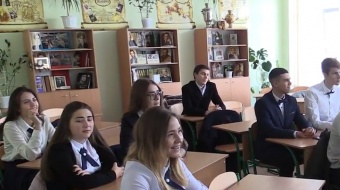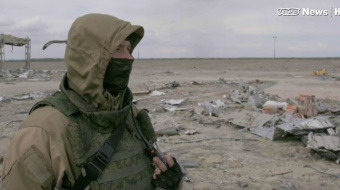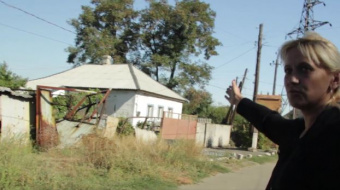Ukraine: Life Near The Frontline - Between Despair And Survival
Ukraine: Life Near The Frontline - Between Despair And Survival
Only 150 people remain in Orlovske, a small village in eastern Ukraine’s Donetsk region only a few kilometres from the frontline. Originally home to 5,000 people before the conflict, now mostly the elderly and families who have nowhere else to go stayed behind. Shelling has destroyed the water supply and the bridge which used to connect the village. Residents now use rain water from the only well in the village and try to maintain a sense of normalcy amidst very difficult circumstances.
ORLOVSKE – Walking through Orlovske, the streets are eerily quiet; only a few children remain after the only school nearby closed down shortly after the conflict began in the summer of 2014. Families with little children had no choice but to leave. Even adults find the village mostly inhabitable; farmers can no longer harvest their crops due to the risk of landmines and many houses have had their foundations severely damaged by shelling. Any hope of a peaceful life has been swept away.
In the village of Orlovske, afftected by the conflict in eastern Ukraine, only people who could not leave remained behind. Photo: WFP/Deborah Nguyen
The bridge that was connecting the village has been destroyed by shelling, leaving its inhabitants isolated. Photo: WFP/Deborah Nguyen
The remaining inhabitants of Orlovske support each other in every day's life. Photo: WFP/Deborah Nguyen
Natalia, 54, is losing hope for better days. Photo: WFP/Deborah Nguyen
Whenever Natalia Natolevska, 54, hears the sounds of shelling, she and her neighbour run to the basement; the only safe place to hide. Her windows were blown out by shelling, and are now covered with plastic sheets.
“My 30-year-old son is stuck in the non-government controlled area of Donetsk, I have not seen him since December 2014. I miss him terribly but I will not allow him to risk his life by crossing the frontline to visit me. The conflict has literally divided my family.
“Only elderly people remain here, it is a dying town, all the young people have left, there’s no future here. I have lost hope. I can’t tell you how much I miss my family. Now, I never eat or buy something that I really like. I am just surviving on basics.
“All we wish for is to be able to sleep in peace at night.”
Katherina, mother of three daughters with her youngest one. Photo: WFP/Deborah Nguyen
Dasha and Sasha standing outside their house. Photo: WFP/Deborah Nguyen
“We stayed inside the house during the shelling, trying to hide.”
Katherina is a single mother and feels painfully lonely; both her parents fell ill and died before the conflict. She has no relatives either to help her out. All she has are her three daughters who she raises on a social welfare allowance. She recalls how the shelling shook her house and the damage it caused that she is now trying to fix with the little money she has.
“I was trying to save some money to send my eldest daughter, 7-year-old Dasha, to school in Mariupol which is about 15 kilometres from the village.
“There are no nurseries nearby and I have no one to look after my children. That is why I cannot work. I feel trapped in poverty.
“With the food I get from WFP at least I can feed them a more balanced diet and I can afford to eat meat, which is provided in the box I received.”
Voda, 8, stands in the ruins of his house. Photo: WFP/Deborah Nguyen
Natalia and her son Voda, they hope that their lives could go back to normal. Photo: WFP/Deborah Nguyen
Natalia, 38, had left the village some time ago to escape the shelling and allow her older son Voda, 8, to continue his schooling. She returned to her house to salvage some personal belongings and return to Mariupol where she rents an apartment.
“Water and electricity were cut off, the windows were broken and part of the roof collapsed. Even if it was safe and I wanted to move back, it would cost a lot to repair the house.
“I hope no one will ever experience what our children had been through. At least now Voda can go to school.
“My dream is that everything goes back to normal so we can move back and live peacefully in our own house.”













